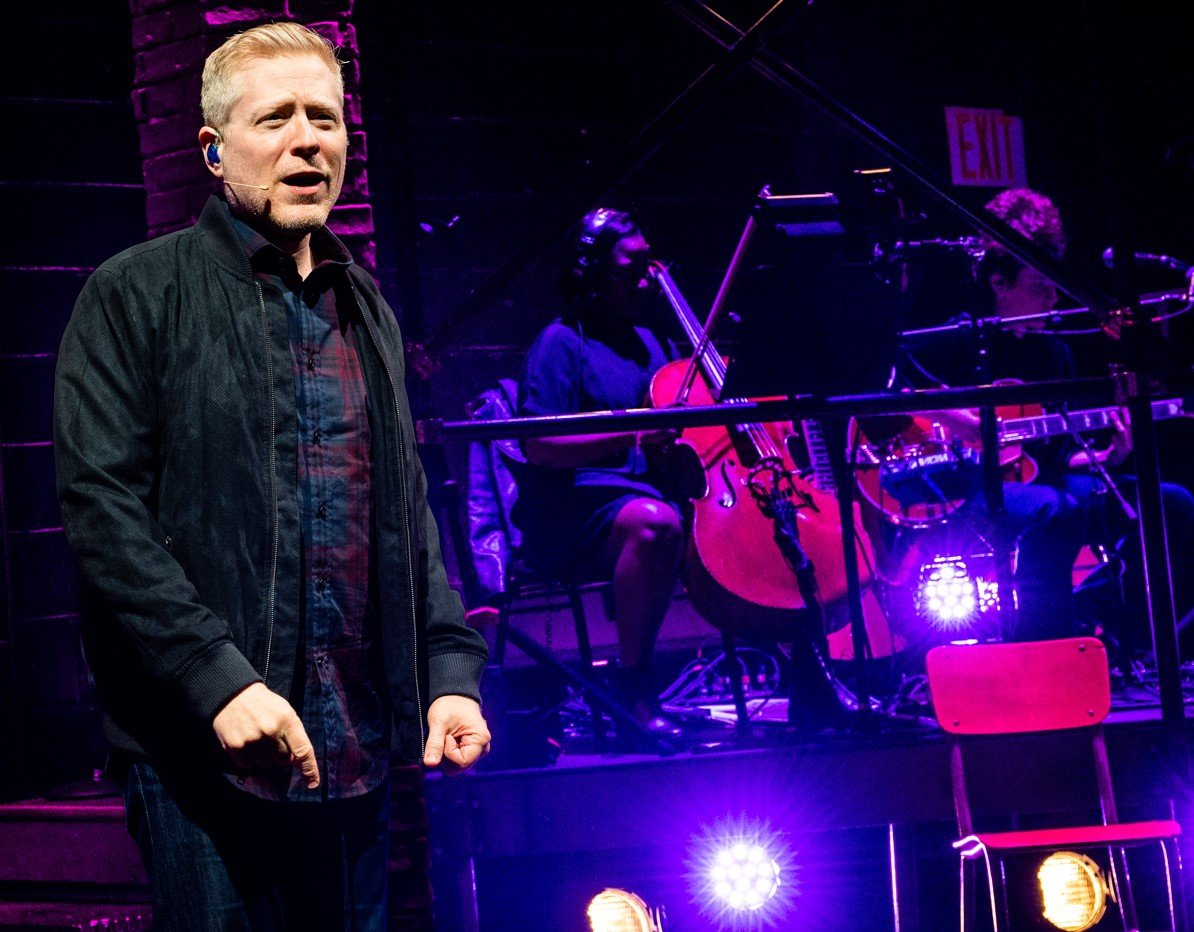In Anthony Rapp’s Without You, at New World Stages, Anthony Rapp and a combo of five first-rate musicians perform songs by Jonathan Larson and others (including Rapp himself) and evoke la vie bohème of New York in the 1990s.
Jonathan Larson, author and composer of Rent, died of an aortic aneurism on Jan.25, 1996, the night before his magnum opus, an innovative rock opera inspired by Puccini’s La Bohème, was to play its first public performance in New York. At 35, Larson had been writing Rent for seven years and would soon be honored posthumously with a Pulitzer Prize for Drama and Tony Awards for best musical, lyrics, and original score of the 1995–96 theater season.
Almost three decades after creating the role of “Mark Cohen,” Rapp is in good voice, his appearance little changed from the way audiences remember him from Rent on Broadway. Photographs by Russ Rowland.
Anthony Rapp’s Without You is a pocket-sized musical concerned, in part, with the backstage drama of Rent and the last months of Larson’s life. It follows the progress of Larson’s rock opera from a 1994 developmental workshop through its Off-Broadway premiere in January 1996 and the transfer that April to Broadway, where it ran for 12 years (5,123 performances). In the original production of Rent, Rapp played Mark Cohen (arguably Larson’s alter ego). He met Larson at auditions for the workshop and, over the next many months, the two became well-acquainted, even close, as members of theatrical companies frequently do during high-intensity rehearsals.
The show is based on Rapp’s 2006 book, “Without You: A Memoir of Love, Loss, and the Musical Rent.” The title comes from a haunting Rent ballad about separation and regret: “The earth turns / The sun burns / But I die / Without you.”
In addition to recounting the tragedy and triumph of Larson’s final year, both the stage show and the book depict Rapp’s relationship with his supportive mother, Mary Baird Rapp. It’s a bittersweet story: as the son’s theatrical career is borne aloft with the spectacular success of Rent, Mary’s health is ravaged by a metastasizing tumor, long undetected, on one of her adrenal glands.
Rapp is the sole actor in Without You, playing himself and everyone else in the saga. He’s supported in the musical sequences by five stellar instrumentalists—Daniel A. Weiss (music director and keyboards), Clérida Eltimé (cello), Paul Gil (bass), Jerry Marotta (drums), and Lee Moretti (guitar). The score includes original music by Rapp, Weiss, David Matos, and Joe Pisapia, plus 10 songs from Rent and REM’s “Losing My Religion,” which was Rapp’s audition piece on the day he met Larson. The Rent melodies remind us how innovative and refreshing that musical was when it conquered Broadway almost three decades ago.
Under Steven Maler’s direction, Without You is receiving a fine production at a theater complex that seldom gets the respect it deserves. Eric Southern’s scenic and lighting designs and David Bengali’s projections efficiently conjure post-Reagan, pre-Internet America in one of the smaller of New World Stages’ five venues. For the scenes in which Rapp returns home to Joliet, Ill., the designers shift to bland visual uniformity that’s a marked contrast to the gritty, way-east milieu of 1990s Manhattan where Rent was created and initially performed.
Anthony Rapp’s Without You, a “memoir of love and loss,” chronicles the unexpected death of composer-playwright Jonathan Larson and the final illness of Rapp’s mother, Mary Baird Rapp.
The show and Rapp’s memoir from which it’s derived are different animals. The book offers a candid portrait of the author’s complicated family—Mary, a hard-working nurse and single parent; his older siblings, Anne and Adam (the playwright whose Red Light Winter was a finalist for the 2006 Pulitzer Prize); their distant father (remarried with new children); and numerous idiosyncratic relatives. Rapp also includes gut-wrenching recollections of his adolescent sexual experiments and efforts, both in adolescence and later, to convince his mother of the integrity of same-sex romantic relationships. In refashioning the memoir as an 80-minute musical, Rapp has streamlined without mercy, concentrating on Larson and the world of Rent, Mary’s medical struggles, and his own responses to success and sorrow. The strategy works—the streamlined narrative is engrossing; Rapp’s performance as his younger self is credible; and the way he channels other characters is touching and often humorous. The emotional resonance of the well-chosen songs compensates for what’s lost in the condensed nature of the libretto.
Rent was famous before it was seen. Larson’s death on the eve of the first public performance (which was also the night the show received an overwhelming response from insiders at a dress rehearsal) was a volcanic news story. The sudden loss of this triple threat—composer, lyricist, and playwright—accelerated attention, but it didn’t make Rent a milestone of theater history. That was due to Larson’s talent and the fact that (like Puccini 100 years before him) he had an uncanny connection to the zeitgeist. How lucky that Rapp, in good voice and still resembling the “Mark Cohen” whom playgoers will remember, is sharing this story in person with Rent aficionados and new audiences in the city where the events took place.
Lisa Dozier and Royal Family Productions’ presentation of Adam Rapp’s Without You runs at New World Stages (340 W. 50th St.) through June 11. Evening performances are at 7 p.m. Mondays, Wednesdays, and Thursdays, and at 8 p.m. Fridays and Saturdays; matinees are at 2 p.m. Thursdays, Saturdays, and Sundays. For tickets and more information, visit withoutyoumusical.com.





